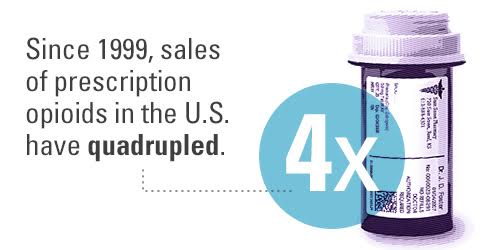
Since 1999, the use of prescription opioids (pain killers) in the United States has almost
quadrupled. Increasingly, people are seeking them out, with millions of them ending up
abusing them (1). Most patients who are taking prescription pain killers do not realize
that addiction is only one of the problems with opioids, the bigger problem is that these
medications may actually be prolonging their pain, rather than effectively managing it.
A recent study from researchers at University of Colorado Boulder finds that opioid use
may prolong the pain that people experience. While their research was conducted on
mice, the results could be the same for humans. They found that there are long term
consequences for using opioids, even for a short period of time. In their research, only
five days of opioid use led to pain that lasted several months. This happens because
the drug worsens the pain signals in the spinal cord (2).
This could come as shocking news to those who are taking the opioids to help curb the
pain, yet the research points to the fact that it may actually make them feel it even
longer. When the pain-response nerves are activated in the brain and spinal cord, as a
result of taking the opioids, it ends up leading to the person feeling pain for a longer
period of time. This could help to create a cycle, thus keeping people seeking more
opioids, because they are continuously chasing pain relief, when they are really
prolonging it from the opioid use.
Until very recently, the use of opioids to treat chronic pain has been drastically
increasing over the years; yet there hasn’t been a lot of research on the long term use
of such drugs, or on the physiological consequences that may exist as a result. As new
research is conducted and such issues are brought to light, more is bound to follow, and
many people may begin to question the frequent usage of these drugs to treat chronic
pain.
Those patients who are taking opioids chronically should be aware that these
medications may be prolonging their chronic pain. They should speak to their
doctors—for some patients there may be better options. There are numerous options for
helping to manage chronic pain. Discuss with your doctors what might work best for
your situation.
Sources:
1. Centers for Disease Control and Prevention. Prescribing Data.
http://www.cdc.gov/drugoverdose/data/prescribing.html
2. PNAS. Morphine paradoxically prolongs neuropathic pain in rats.
http://www.pnas.org/content/early/2016/05/25/1602070113.abstract







